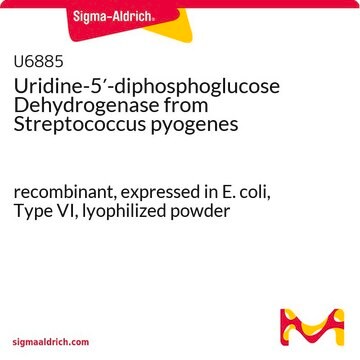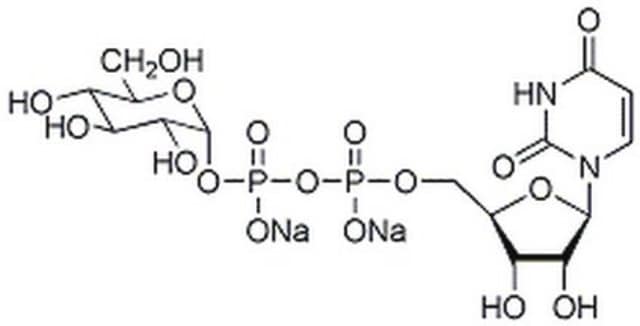U8501
Uridine-5′-diphosphoglucose pyrophosphorylase from baker′s yeast
Type X, lyophilized powder, ≥40 units/mg protein
Synonym(s):
UTP:α-D-glucose-1-phosphate uridylyltransferase
About This Item
Recommended Products
biological source
bakers yeast
Quality Level
type
Type X
form
lyophilized powder
specific activity
≥40 units/mg protein
composition
Protein, 30-60% modified Warburg-Christian
foreign activity
UDP-glucose dehydrogenase and galactose-1-phosphate uridyltransferase ≤0.1%
inorganic pyrophosphatase ≤0.5%
storage temp.
−20°C
Looking for similar products? Visit Product Comparison Guide
General description
Application
- in the synthesis of uridine-5′-diphosphoglucose (UDP-Glc)-13C9
- to quantify Suc synthase (SUS) enzyme activity in rice
- to study the role of hexokinase and glycogen synthase controls the flux in frog oocytes
Biochem/physiol Actions
Unit Definition
Physical form
Storage Class Code
11 - Combustible Solids
WGK
WGK 3
Flash Point(F)
Not applicable
Flash Point(C)
Not applicable
Personal Protective Equipment
Certificates of Analysis (COA)
Search for Certificates of Analysis (COA) by entering the products Lot/Batch Number. Lot and Batch Numbers can be found on a product’s label following the words ‘Lot’ or ‘Batch’.
Already Own This Product?
Find documentation for the products that you have recently purchased in the Document Library.
Customers Also Viewed
Our team of scientists has experience in all areas of research including Life Science, Material Science, Chemical Synthesis, Chromatography, Analytical and many others.
Contact Technical Service










